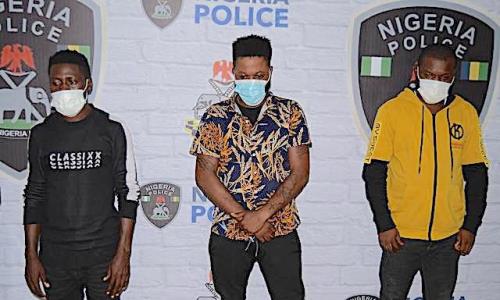The police in a statement identified the suspects as Samson Inegbenesun, 30 years old, Blessed Junior, 32 years and Muhammed Zakari 36 years.
The trio were arrested in Uromi in Edo State by operatives of the Nigeria Police Cybercrime Unit, INTERPOL National Central Bureau (NCB), Abuja.
The police said the suspects were arrested following investigations into suspected fraudulent online procurement and supply of COVID-19 protective mask, received through the INTERPOL NCB Wiesbaden, Germany.
Investigations revealed that Samson Inegbenosun is an internet fraudster and a member of a Turkey-based online scamming syndicate.
He supplies foreign and local bank accounts to receive fraudulent funds and use same as conduit to other feeder accounts.
The Police have recovered from him, a building worth N20 million, a Toyota RAV-4 2015 model worth N6.5 million and a Toyota Matrix 2002 model valued at N2 million which he procured with the proceeds of the crime.
The second suspect, Blessed Junior, returned to Nigeria from Italy in February, 2020 but maintained close contacts and illicit dealings with his Italian associates.
Investigations revealed that he has made over N120 million from internet fraud and other cybercrime dealings.
He also received the sum of €52,000 recently from his criminal associates in Italy as commission for his active involvement in an international cybercrime deal and owns a filling station established with the proceeds of the crime.
Mohammed Zakari was the third suspect arrested.
The Police described him as an expert in internet fraud, identity theft and impersonation.
He falsely claims to be a British citizen.
He also poses to be one Kelly Galk on online dating apps which he uses to carry out romance scams and to defraud unsuspecting members of the public, locally and internationally.
He too has repeatedly made millions of naira from his illicit cybercrime transactions since he joined the syndicate.
The police said all the suspects will be charged to court on conclusion of investigation and prosecuted in line with the Cybercrime Prevention/Prohibition Act, 2015.

















